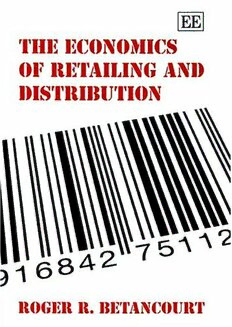
The Economics Of Retailing And Distribution PDF
257 Pages·2005·1.737 MB·English
Most books are stored in the elastic cloud where traffic is expensive. For this reason, we have a limit on daily download.
Preview The Economics Of Retailing And Distribution
Description:
This book provides a uniform and coherent approach to the analysis of distribution systems in general and retail systems in particular. It develops the fundamentals of retail demand and supply, and demonstrates how the provision of distribution services is a principal determinant of economic outcomes in retail exchanges for both retailers and their customers, as well as for other agents such as suppliers and franchisors. The author integrates the existing literature with new applications to provide novel insights into the multi-product nature of retailing, the service aspects of packaging, and the evolution of retail formats such as supermarkets, non-store retailers (including the Internet) and shopping centers. He illustrates how the complementarity that underlies retail activities leads to lower average prices for customers. This integrative process also brings out the role of distribution services as mechanisms to exercise economic power. This is evident not only in channels of distribution but in the evolution of Wal-Mart and the development of franchise contracts. The author also identifies the crucial differences between the retailing of goods and the retailing of services. This impressive volume skillfully integrates conceptual, theoretical and empirical research to analyze critical issues in the economics of retailing and distribution. It will be required reading for academics and professional economists interested in industrial organization, marketing, applied microeconomics and business.
See more
The list of books you might like
Most books are stored in the elastic cloud where traffic is expensive. For this reason, we have a limit on daily download.
